Week-to-Week: Heartstopper, Teen Drama, and the Critical Margins of Peak TV
Coverage plans for Netflix's queer YA adaptation, plus Russian Doll and Better Call Saul
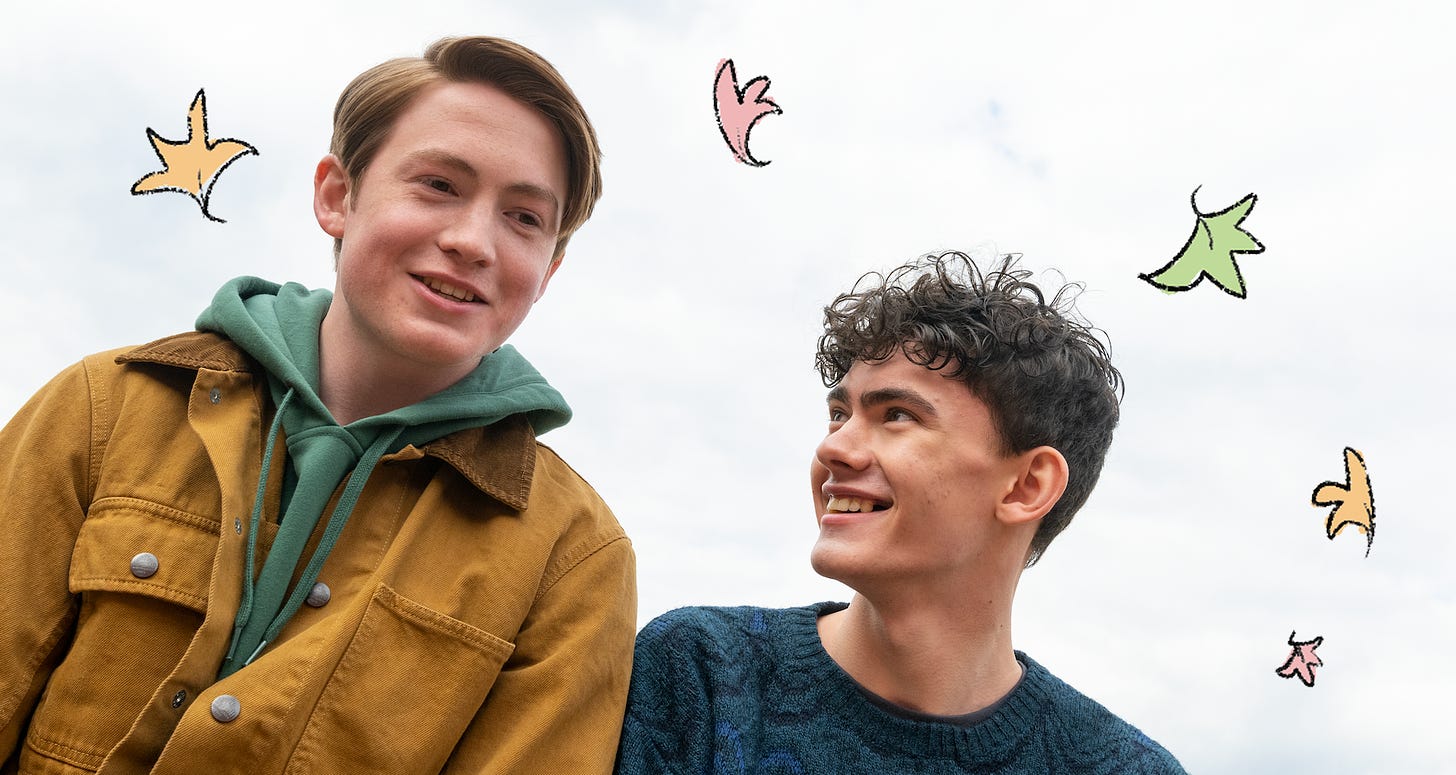
As mentioned in last week’s newsletter, today marks the beginning of an exciting development here at Episodic Medium: Donna Bowman is concluding her 14-year run covering Breaking Bad and its prequel Better Call Saul by reviewing the sixth and final season of the latter. I’ve been thrilled to see so many people express the proper excitement that she’ll be able to finish this project out, and hope that you’ll help me support her by subscribing if you’re a fan of the show, and joining in the conversation.
Donna’s first review will go live on the Substack tonight when the episodes finish airing on the east coast, and you’ll receive it via email tomorrow morning—this was the system I developed for Severance, and I’ll stick to it in this case. As with other shows Episodic Medium covers, the first review will be free to all subscribers and anyone who clicks on the Twitter links, but subsequent reviews will be exclusively to paid subscribers. If you have $10 to spare to join us for the next six weeks, I think it’ll be more than worth it.
However, it’s not the only new show Episodic Criticism is covering this week. On Wednesday, Russian Doll returns for its second season, and since it was one of the shows I suggested I would be covering, I intend to offer a formal review of the premiere, check-ins while watching as thoughts/circumstances warrant, and then a formal review of the finale. But Netflix shows are difficult to write about in this space given that everyone moves at a different speed, and frankly I don’t know how fast I will be moving through the show personally since it’s the end of the semester. So consider this an experiment at just kind of bringing you along for the flow of my TV viewing as part of the value of your subscription, whether that takes one week or three.
And yet, that’s not all. As I noted when I started this project, we can’t fully predict which shows will catch our attention, whether that be shows that emerge unexpectedly as critical darlings or those which resonate with us personally. Part of the reason I launched Episodic Medium was to be able to write about television how I wanted, and to follow whims that no website would likely ever pay me to follow. Which is why the next show I’m covering episodically for Episodic Medium is a show whose audience is unlikely to—and, for that reason, won’t have to—pay me $5 to read what I have to say about it.
As I’ve spent the past few weeks with screeners of Netflix’s new teen drama Heartstopper, which debuts its first season on April 22, I had been anticipating this past Friday. With the embargo lifted, critics were able to share their thoughts about the series openly, providing fans of Alice Oseman’s webcomic turned graphic novel series of the same name insight into how the story of—to quote the back cover—”Boy meets boy. Boys become friends. Boys fall in love” has been brought to life.
There’s a few reasons I was looking forward to these reviews. The first was the general curiosity you have as a critic when you’ve been watching something in isolation, and lack the collective consciousness that comes when a show is publicly available. The second was wondering if any other critics were, like me, experiencing the show as an adaptation: I’ve recently read through the four collected volumes of Heartstopper and very much experienced the show through the lens of how Oseman takes advantage of the shift in medium to find new dimensions to both the central couple—Charlie Spring and Nick Nelson —and the cast of supporting characters.
And the third was, frankly, the question of whether anyone else was watching at all.
From a critical perspective, Heartstopper arrives at what may be the definitive moment of “Peak TV,” as I discussed with subscribers in this weekend’s open thread. It feels like the industry has collectively given up on spreading out the shows they’re releasing, cramming everything into the six weeks before the end of the Emmy eligibility period. The result is an epic pileup of both new and returning series that demand critical attention, including on Netflix itself, where the aforementioned critical darling Russian Doll drops only two days before Heartstopper (presumably to land on the thematically appropriate 4/20).
It’s created an environment where shows that would have already struggled to find oxygen are potentially not getting a chance to breathe at all, and Heartstopper falls into this category. In the leadup to its release, press—primarily in the U.K., where the graphic novels and the show are both set—have consistently written about how Heartstopper is “the anti-Euphoria” and that it “puts the emphasis on telling positive and uplifting LGBTQ+ stories” as opposed to stories about tragedy or trauma.
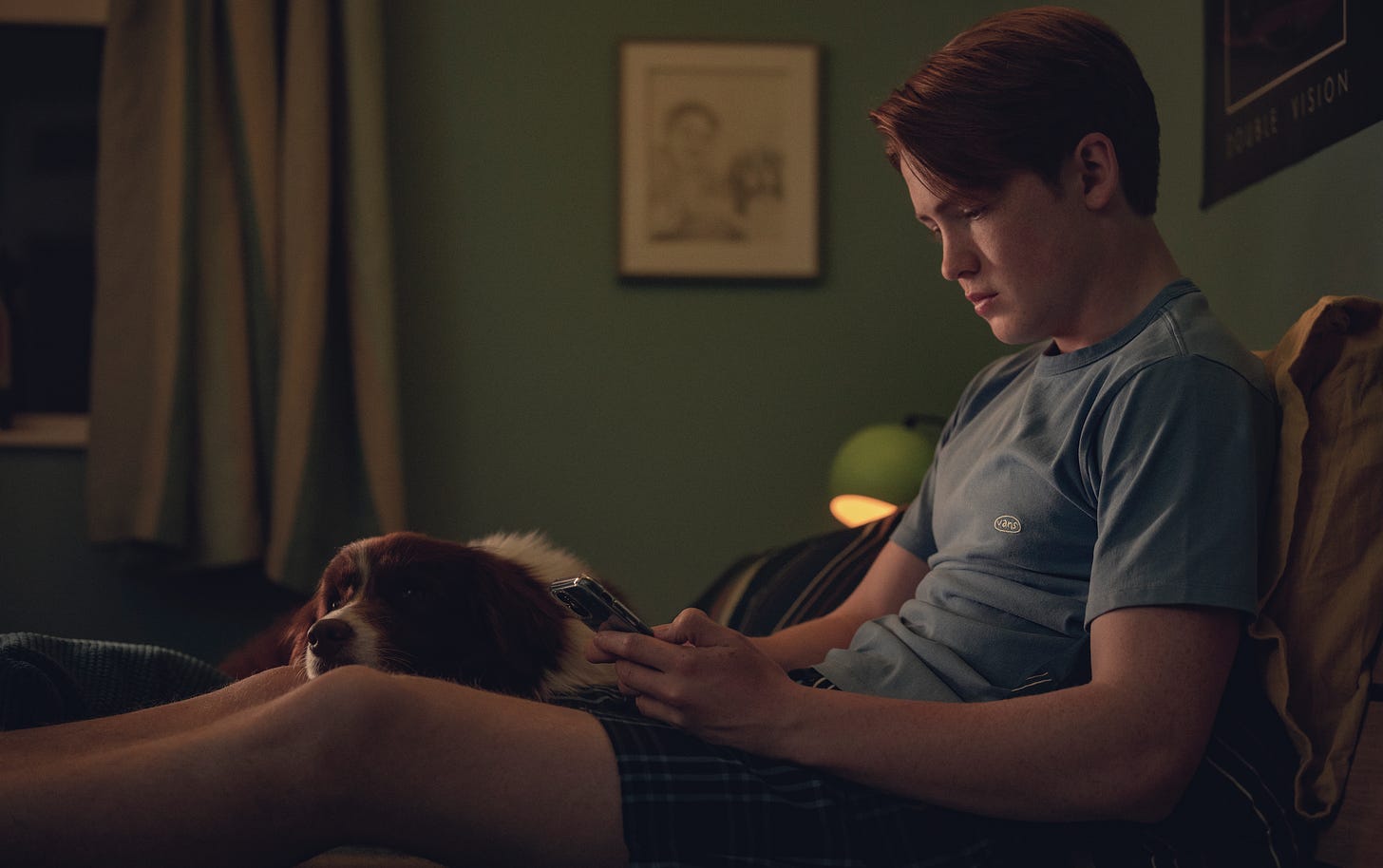
But this is part of why the show has such little critical conversation around it. The truth is that generalist TV critics often only pay attention to teen shows when they take on the auspices of prestige drama like Euphoria, and are more likely to write about queer shows when they’re historicizing rather than romanticizing. Critics were already unlikely to invest significantly in reviewing a show like Heartstopper, but in a Peak TV climate where even a team of critics for major publications can’t cover everything it’s not shocking if a teen drama based on a queer young adult webcomic doesn’t break through the clutter.
As such, the majority of the reviews of Heartstopper that emerged when the embargo lifted were invested in the project for specific reasons: the majority are based in the U.K., where Netflix is pitching the show as a local original given its unabashedly British setting, and many reviewers specifically emphasize its contribution to LGBTQ+ representation because it’s a project that they as an individual are already personally invested in. Only a handful of the reviews from major publications are based in the U.S., not yet enough to qualify for a Rotten Tomatoes score, and while further reviews popped up from smaller fan sites, the show’s absence within a broader critical discourse points to the challenge facing any new series, let alone one focused on queer teens.
The lack of critical attention on Heartstopper is not necessarily damaging to its future success. The show will live or die based on audience enthusiasm, and the reviews it does have are in many cases raves. And while I don’t necessarily co-sign Metro’s hyperbolic claim out of the U.K. that the show will “transform the LGBTQ+ community,” I’ll add my own voice to the conversation and say that Heartstopper is winsome and winning, a heart-on-its-sleeve tale of romance and friendship that navigates the challenges of modern queer representation with subtlety that its early press doesn’t necessarily capture.
While presented as an antidote to dramas that associate queerness with death and persecution, the show resists turning this into a post-queer fantasy, ensuring that its various windows into queer identity acknowledge the difficult world awaiting these teenagers as they move forward into adulthood. While there are plenty of swoon-worthy moments pulled from the frames of Oseman’s comic, and the show’s overall worldview is certainly optimistic and romantic, her adaptation is still grounded in reality, and centers queer community beyond its central character unlike some other shows I’m still mad about. Expanded roles for Charlie’s trans friend Elle and her classmates Tara and Darcy at this stage in the story deepen the show’s investigation of navigating one’s identity at such a crucial moment: director Euros Lyn may have created a dream-like aesthetic, but the show knows this can be a nightmare, and finds uplift within rather than outside of that reality in a way that made me want to write about it—so I am.
My decision to write about Heartstopper here at Episodic Medium comes from two places. One is my penchant for queer stories that I wish I had access to when I was a teenager, grappling with questions about sexuality that I simply didn’t have the capacity to ask—let alone answer—at that time. It’s a bit cliché now to note how each new show featuring representation of queer characters—whether they be gay, lesbian, bisexual, trans, asexual, intersex, etc.—will create opportunities that earlier generations never had, but it’s also true. I don’t know if Heartstopper’s approach is necessarily as transformative as some of the reviews claim, but there are some specifics about its story that resonated with me directly, and exploring those critically is something I’m committed to doing more often.
The second place, though, is my firm belief in the cultural value of teen shows like Heartstopper, and in providing spaces of critical reflection around media that is—as evidenced by the dearth of reviews—often excluded from that discourse. When I started writing about Awkward. for The A.V. Club, I got an email from creator Lauren Iungerich because she was thrilled someone was investing in the themes and storylines of her show in the way she and her writers had.1 I know that the average Heartstopper viewer will be far outside the demographic for episodic criticism, and that even the average Heartstopper reader won’t necessarily be interested in my essays focused on subtle and significant changes Oseman made to the story while adapting it, but on principle I think that writing should exist, and committed to writing it as a result.
However, as I did so, I realized that I’ve always thought of this particular type of writing as a service, whether it was my intrepid coverage of ABC Family’s Huge or my 2017 writing about the final season of Norwegian webseries Skam. If the goal is to introduce critical discourse into popular conversations, and to expose those embedded within critical discourse to the series, then to lock that behind a paywall runs counter to the whole enterprise.
As such, I’ll be making my episodic coverage of Heartstopper free to everyone, albeit with commenting privileges still locked behind a paid subscription. I’ll also be making my reviews of all eight episodes available on Friday when the season debuts, although I will avoid clogging up your inboxes by simply sharing the first review via email, along with an “Episodic Archive” post where links to all eight episodes will be available. While this might not be the type of show that brought you to Episodic Medium, I hope my reviews serve as a valuable companion to your experience if you choose to dive into Charlie and Nick’s story, and look forward to the conversation we’ll have about it in the days ahead.
Episodic Observations
I watched the first two episodes of Moon Knight over the weekend, and it sort of defies analysis, to be honest? I’m trying to imagine writing about it, but what would I even say as someone with no context for the comments? I’m enjoying F. Murray Abraham’s voiceover performance, and Isaac and Hawke are both fun, but there’s just not much there yet, which would explain why I felt like I was spoiled on nothing for the show as no one on my Twitter feed is actually discussing it in any detail. I’ll finish out the six episodes, but I’m curious if/when it starts to feel like a more vital viewing experience.
Abbott Elementary ended its first season with a charming finale that stayed true to the basic ethos of the show, even if I once again feel like it would have been a perfectly fine story without the JimPam of it all—Barbara’s daughter being there gave major “Booze Cruise” vibes, for example, and there’s just something about when the show leans into the romantic side of things that its relationship with its clear stylistic influence slips into pastiche. Still, I hope they get the money they deserve for the second season, and not just so I’m not subjected to more of the truly “Erin in front of the house in Florida”-level visual effects work.
As I noted when I wrote about it in my final piece for The A.V. Club, Ghosts is well-situated to juggle its premise as it sees fit, and the penultimate episode of the season pulled a teen ghost (Odessa A’Zion, Pamela Adlon’s daughter) out of the attic to justify a fun Ghost Prom. A’Zion was the best part of the short-lived Netflix drama Grand Army, which continues to haunt my every waking moment with its scene where a character uses Purel on his genitals. Yes, this bullet point was mostly an excuse to force others to share in my mental anguish at carrying this memory. Thank you.
To answer my own weekly discussion, this week I will probably end up starting the second season of The Flight Attendant out of the myriad Peak TV offerings that aren’t the one I’m covering, mostly because it feels the most recent and thus the most interesting to see how it evolves this time around. I had three full years to catch up on Barry’s second season, and I still never managed it, so it’ll be going on the rainy day list of shame, to go back to my first weekly newsletter.
Lauren also agreed to answer any questions I had, which is such a dangerous thing to tell a critic. She has since been incredibly generous in her time joining my classes remotely to discuss her career on multiple occasions.





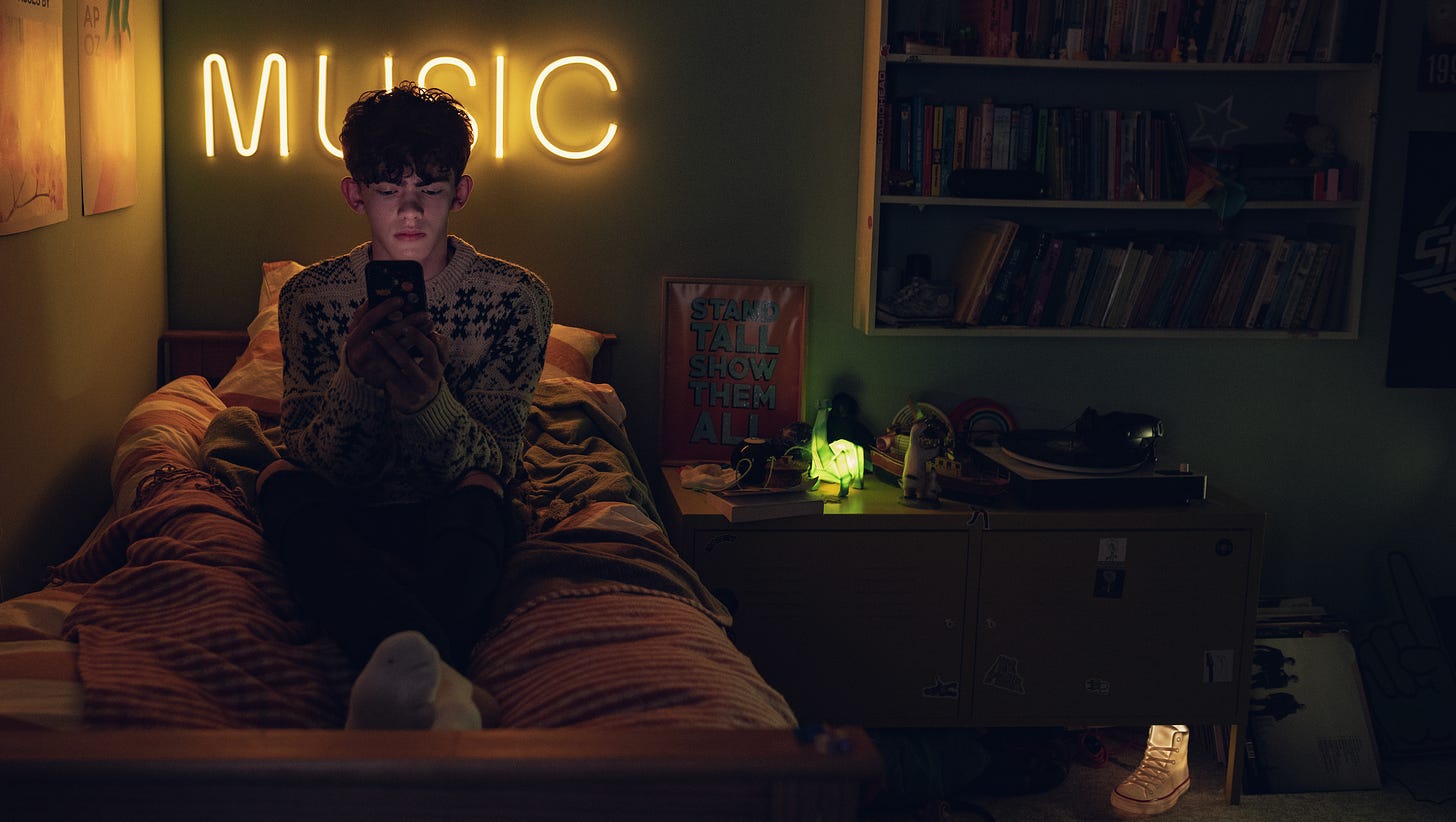
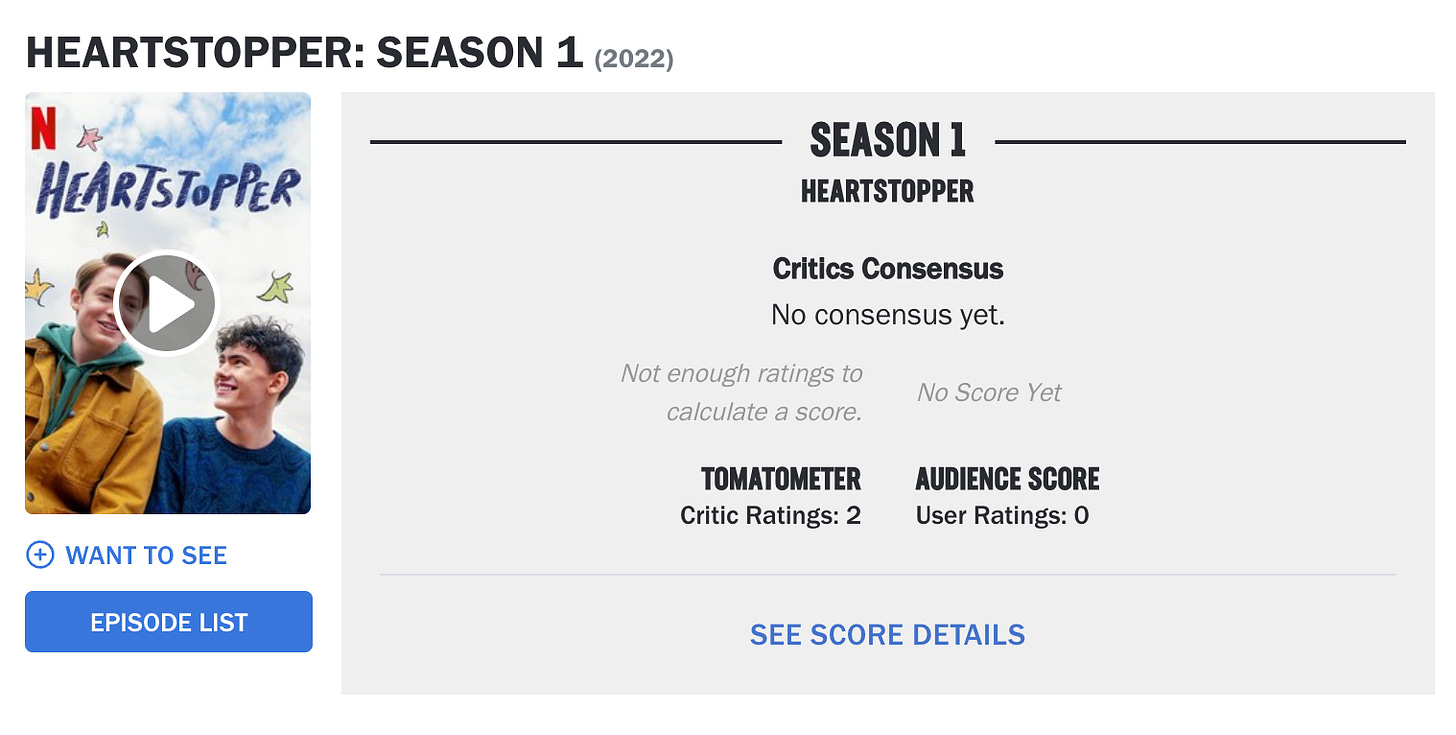
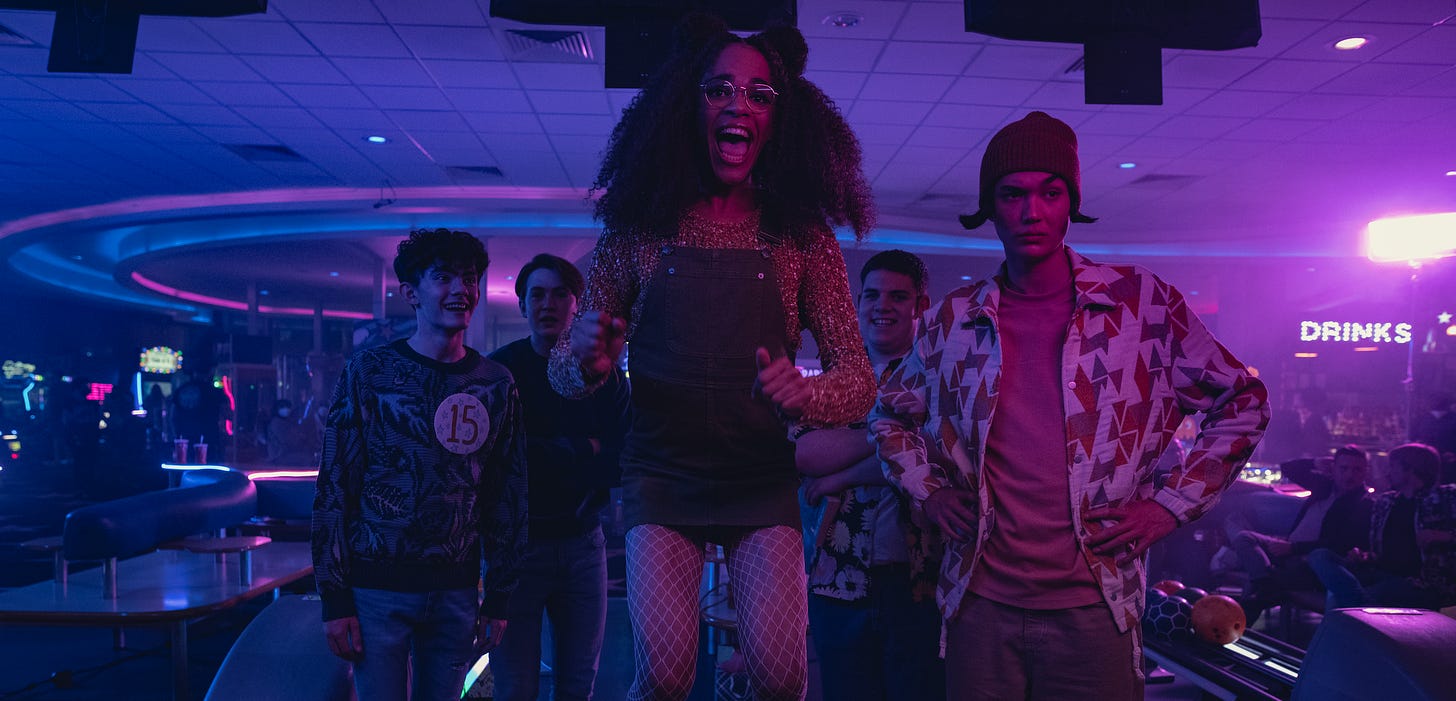
Myles: Your disappointment with Love ,Victor season 1 is well documented. What did you think of season 2?
Thank you for your words about Heartstopper and about queer content in general, Myles. It's very encouraging to see critics committing to giving space to shows like this that would probably be lost between the non-stopping barrage of content (and still might, but one more voice discussing its merits is worth a lot).
I'm planning on watching this show because, I'll be honest, thanks to how starved I was myself for queer content in my teen years (and I had it way better in the aughts than other people had it in the nineties, eighties and before!), I've come to a point where having it will usually increase my estimation of a piece of media by at least a little bit (and usually more than a little bit). I'm predisposed to liking it, basically. And even now, with all the progress that has been made, it still feels like it's hard to find content that isn't rooted in the fundamental misery of being queer. A fundamentally positive but true-to-life TV show about queer love sounds like the exact antidote that I need for that type of mindset.
Now the big question that I need to answer is if I should read the comics before watching the show. I usually don't bother (and only consider going to the source material *after* I watch the thing, because I'm terrible like that), but your reviews being informed by them being adaptations sounds like an extremely interesting perspective that I would enjoy sharing.